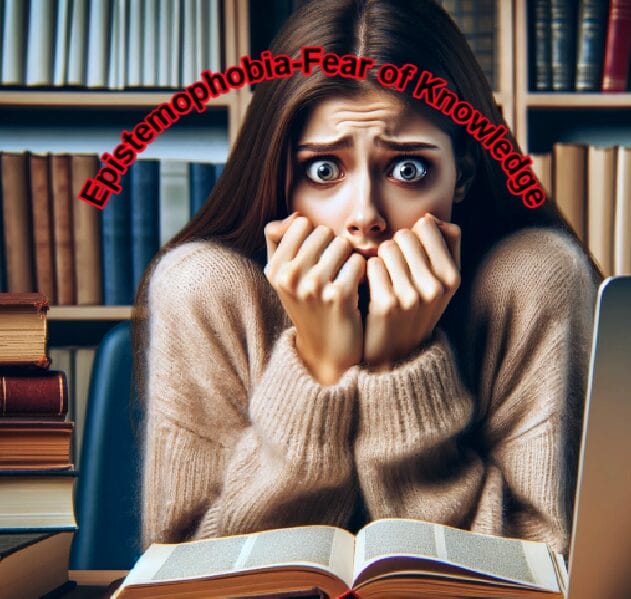Share This Article
Do Not Fear Learning More about Epistemophobia, A Rare Phobia
Epistemophobia, or the fear of knowledge, is a unique and often misunderstood phobia. While it might sound strange to be afraid of gaining knowledge, for those who suffer from it, this fear can be very real and debilitating. This phobia can severely impact one’s personal and professional life, making it difficult to engage in everyday activities that involve learning or encountering new information.
What Is Epistemophobia?
Epistemophobia is the intense fear of knowledge. This fear can manifest in various ways, such as anxiety about learning new things, avoidance of educational settings, or a general dread of acquiring information. For some, the mere thought of encountering new knowledge can trigger significant stress and anxiety.

Causes of Epistemophobia
The causes of epistemophobia can vary widely from person to person, but some common factors include:
Traumatic Experiences
- Negative experiences related to learning, such as being ridiculed in school.
- Associating knowledge with failure or embarrassment.
Cultural and Social Influences
- Societal pressure to achieve high academic standards.
- Fear of being judged or ostracized for not knowing something.
Personal Beliefs and Perceptions
- Belief that knowledge can lead to negative consequences.
- Fear of the unknown and the uncertainty that comes with new information.
Underlying Anxiety Disorders
- Generalized anxiety disorder or other phobias that may contribute to epistemophobia.
A Personal Story from Alexa
Meet Alexa, a 25-year-old aspiring artist who developed the very rare but very real epistemophobia and this happened during her high school years. As with most Alexa had been a curious child, looking and learning about the world around her. However, a series of humiliating experiences in school, where she was often excessively ridiculed by peers and made the scapegoat for some teachers for the class not performing well enough. These unfounded experiences added up and led to a growing fear of acquiring new knowledge, especially having others know her intelligence level.
By the time she reached college, Alexa’s fear had become so intense that she avoided attending lectures and participating in discussions, this had really gotten out of control. Her grades suffered, and she felt trapped in a cycle of fear and avoidance. The idea of learning something new filled her with completely unjustified worry, and she started to believe that knowledge would only bring her and her loved ones more pain and embarrassment. Can you imagine fearing what most of us covet and strive for, KNOWLEDGE? It seems counterintuitive on all levels, you are not ridiculed for being dumb but for being smart?
Realizing that this phobia was taking over her life, Alexa decided to seek help. She began working with a talk therapist who specialized in cognitive behavioral therapy. Through CBT, Alexa learned to identify and challenge these irrational thoughts about knowledge. Her therapist guided her through gradual exposure exercises, where Alexa started with small, manageable bits of new information and slowly worked her way up to more complex topics. The best part was most of this treatment plan was done online in her apartment, less stress, travel and cost.
Additionally, Alexa joined an online support group for individuals with specific phobias. Sharing her experiences and hearing others’ stories made Alexa feel less alone and gave her the encouragement she needed to keep pushing forward. Over time, Alexa’s fear of knowledge and learning began to diminish by leaps and bounds. She started attending art classes again, discovering that learning could be a positive and enriching experience especially without excessive debilitating fear.
Symptoms of Epistemophobia
People with epistemophobia may experience a range of symptoms, both physical and psychological. These symptoms can interfere with daily activities and overall quality of life.
Physical Symptoms
- Rapid heartbeat
- Shortness of breath
- Sweating
- Nausea
- Trembling or shaking
- Dizziness
Mental/Emotional Symptoms
- Intense anxiety or panic at the thought of learning new information
- Avoidance of educational settings or situations where learning is involved
- Difficulty concentrating or thinking about knowledge-related topics
- Feelings of dread or terror when confronted with new information
- Irritability or mood swings
Treatment for Epistemophobia
Both self-help strategies and professional treatments can be effective in managing epistemophobia. It’s important to find the right approach that works for the individual.
Self-Help Strategies
- Gradual exposure: Slowly exposing oneself to new information in a controlled manner can help desensitize the fear response.
- Relaxation techniques: Practices like deep breathing, meditation, and progressive muscle relaxation can help reduce anxiety.
- Positive reinforcement: Rewarding oneself for successfully learning new things can create positive associations with knowledge.
- Support groups: Connecting with others who have similar fears can provide comfort and practical advice.
Professional Treatments
- Cognitive behavioral therapy (CBT): This therapy focuses on changing the thought patterns that lead to the fear response. A therapist might help the person challenge their irrational thoughts about knowledge.
- Exposure therapy: Under the guidance of a therapist, the person is gradually exposed to new information in a safe environment to lessen the fear over time.
- Medication: In some cases, medications such as anti-anxiety drugs or beta-blockers may be prescribed to help manage severe symptoms.
- Hypnotherapy: This treatment can help address the subconscious mind’s role in the phobia.
In Conclusion: Living with Epistemophobia
Living with epistemophobia can be challenging, but it is possible to manage and even overcome this fear. Here are some tips for coping with this excessive fear:
- Accept the fear: Acknowledge that the fear is real and that it is okay to feel anxious about acquiring new knowledge.
- Seek support: Whether through therapy, support groups, or trusted friends and family, don’t be afraid to ask for help.
- Take small tteps: Gradually expose yourself to new information at a pace that feels comfortable for you.
- Celebrate progress: Recognize and celebrate your achievements, no matter how small they may seem.
- Practice self-care: Engage in activities that promote relaxation and well-being, such as exercise, hobbies, and mindfulness practices.
Those who suffer from epistemophobia can learn to control their fear and appreciate the benefits of learning by following these guidelines and making use of the tools that are available to them. Like Alexa, you too may turn your fear of knowledge into a chance for personal development and advancement.



